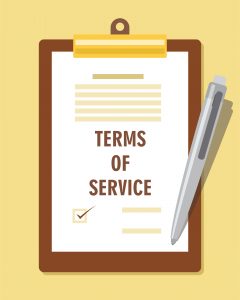The Terms of Use for a website is critical to maintaining control of how users access and use the information on the website, and in limiting liability for unapproved uses. Regardless of whether users actually read the Terms of Use – many don’t because it typically contains complex legal jargon – the Terms of Use binds users to its terms by virtue of their use of the website. The Terms of Use constitutes a contract between the business and the customer. That legal jargon protects from liability from users and allows control over the information contained on the website.
Businesses with an online presence — whether it be social media, e-commerce, mobile, static or interactive site — should always craft a carefully written Terms of Use. These terms are written to include a variety of different subjects relating to the business, the customer, information that is exchanged, information received and how that same information may be used.
Avoid Using Boilerplate or “One Size Fits All”
Crafting Terms of Use is a daunting task. Given the size of this task, it is unsurprising that some businesses would seek to adopt a similar company’s Terms of Use; while the contents of a Terms of Use might be modified to suit the business’ needs, businesses should avoid this practice altogether. For example, if you use boilerplate from a website that does not address user contributions, but your website does, your Terms of Use will be missing critical legal protections.
Terms of Use should be unique and crafted according to the purpose of both the business and its on-line presence. This requires Terms of Use that is tailored carefully to match the business model and objectives while most effectively reducing potential liability. Because boilerplate is by its very nature broad in scope, it will very likely fail to account for the website’s particular business model and objectives.
Receiving Customer Information. Now What?
The majority of websites today collect a significant amount of information from those accessing a page. This information can include everything from IP addresses, shared third-party content, user contributions and anything that the user actively and willingly shares. How a business acquires, manages, and uses this information is of paramount importance in a website’s Terms of Use.
It is important that a business identifies both the information it seeks to access from customers and the manner in which it intends to use that information. This should be done prior to developing Terms of Use as it will allow the business to tailor the language appropriately so that it can be read and understood by customers. Failing to provide clear terms can cause public relations nightmares or could altogether dissuade customers from visiting the business’s website.
Contact your Silicon Valley Corporate Business Lawyer Today
Drafting a website’s Terms of Use is an important action for any business with an online presence. Businesses should draft Terms of Use carefully, ensuring that they fit their business model and both its business and legal objectives. Businesses should work with a legal team, such as Structure Law Group, LLP, to successfully develop terms that protect its interests and clearly inform customers regarding the use of any information. If you are in the process of drafting your website’s Terms of Use, please contact our experienced Silicon Valley corporate attorneys at Structure Law Group, LLP at (408) 441-7500 or email us today. Our team will help draft a Terms of Use that best suits the business and its legal objectives.
 Business Lawyers Blog
Business Lawyers Blog


